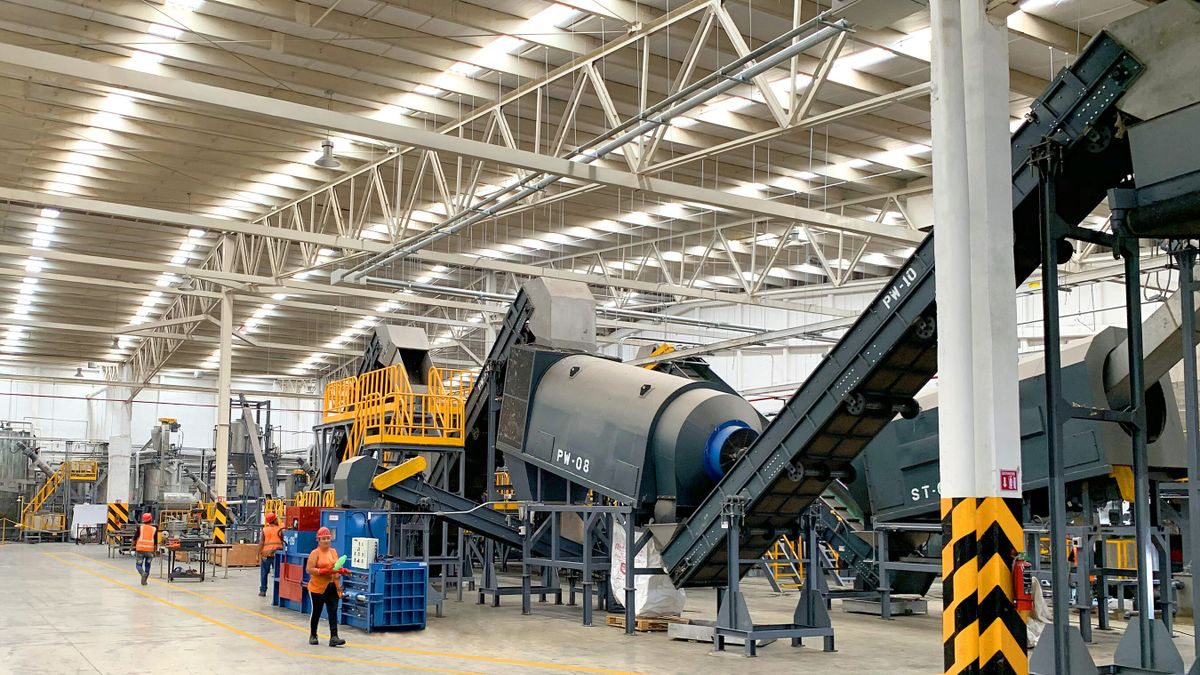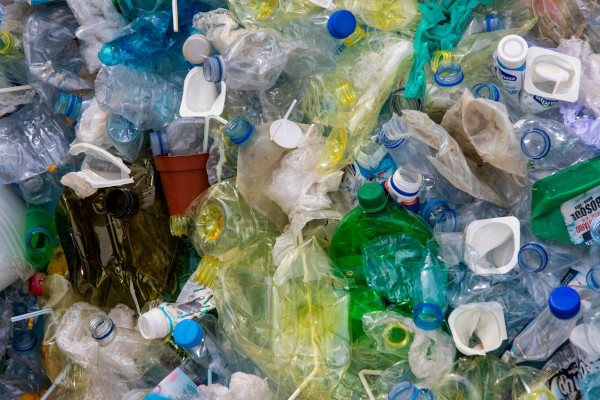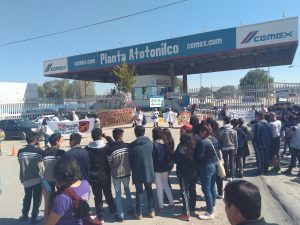
This section presents case studies that highlight the impact of plastic waste colonialism.
Cement companies in the Tula–Apaxco–Atotonilco corridor: Sacrifice zone
Cement companies in the Tula–Apaxco–Atotonilco corridor: Sacrifice zone
Six of Mexico’s more than 30 cement companies are located in the Tula–Atotonilco– Apaxco industrial corridor. The Tolteca region of the Tula River, Río Seco and Mezquital Valley between Estado de Mexico and Hidalgo, is recognized as one of the sacrifice zones in Mexico with the highest environmental devastation and negative health effects for decades, which affects its territory due to the high concentration of extractive, energy, and cement industries. There are eight cement companies in Valle del Mezquital that produce 40% of the country’s cement.
The burning of many types of waste in the cement industry is known as co-processing and causes serious environmental pollution such as greenhouse gas (GHG) emissions, persistent organic compounds (POPs), heavy metals, and many other toxic substances that cause hormonal, cognitive, and immunological alterations.
The authorizations given by the Semarnat (Ministry of Environment) for the burning of waste in cement kilns (co-processing) range between 30% and 80% substitution of alternative fuels, and authorizations are shown from 2013, with the longest validity in 2031 and one plant with an indefinite permit.
In the strongest social movements in this Region Tolteca, there are community, indigenous, activist and environmental organizations such as the Frente de Comunidades en Contra de la Incineración; Movimiento Ambientalista Pro-Salud; Laboratorio de Investigación en Desarrollo Comunitario y Sustentabilidad (LIDECS); No incineración/Quemar basura mata; Global Alliance for Incineration Alternatives (GAIA ); NEB (No es Basura ); Observatorio de Emergencias Socio-Ecológicas .
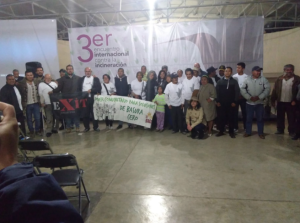
Currently, we believe that the massive increase in the export of plastic waste from the United States to Mexico coincides with the increase in the incineration of these materials in cement kilns used as an alternative fuel for co-processing. Furthermore, because of the business deals made between the beverage and food industries, municipalities, and many others, their packaging, plastic waste, and residues are burned in cement kilns. They argue that it is “recycling” or a “new neutrality of plastics” (see case study below), which is why this mapping work is carried out.
CEMEX. 2 Facilities: Atotonilco and Huichapan
Cemex. The Atotonilco plant has an authorization to co-process waste until 2028, for 30% of the waste being substituted as an alternative fuel.
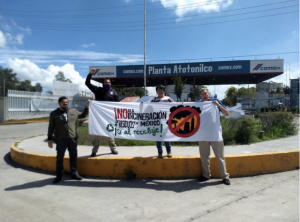
This Mexican company has been involved in major socio-environmental conflicts with strong social mobilizations, violence, plant closures, protests, environmental injustice, human rights violations, and extensive activism and advocacy work.
The source of conflict is the development of activities related to the preparation, mixing, and burning of industrial, commercial, housing, and post-consumer waste, generating violations of Economic, Social, Cultural, and Environmental Rights (ESCER). To date, toxic waste incineration has been the main trigger of conflicts.
Cemex burns solid waste from Mexico City and Querétaro , among others. CEMEX, Pro Ambiente, Tetra Pak, and Queretaro’s council (which sends 4,500 tons of solid waste monthly for energy recycling through the company Broquers Ambiental ) have businesses to burn waste.
Mexico City is served by CEMEX sorting facilities, which are in charge of co-processing the inorganic fraction that is not recyclable or of limited use. The result is the creation of Refuse Derived Fuels (RDF ) with a total of 312 t/day. (See interactive map “plastic fuel as an RDF in Mexico” that shows the locations where RDF is formulated and used).
In 2021, CEMEX burned near 23 million of tons of waste and no recyclable by-products. To have an idea about the savings in the energy factures of these companies, Cemex announced that in 2017, the use of alternate fuels generated savings for 123 millions of dollars annually , while in its integrated report of 2021 it is signaled that they reach the highest replacement rate in the history of the company with 29,2%.
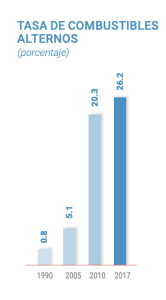
The Environmental Justice Atlas EJAtlas documents and catalogs social conflicts regarding environmental issues, provides a broader outlook of this conflict .
PROAMBIENTE/REGENERA-CEMEX
Located in Huichapan, Hidalgo, this company is also part of the Region Tolteca from Río Tula-Río Seco, Valle del Mezquital and is dedicated to the preparation of waste for its co-processing at Cemex facilities. Similar to the previous case, social mobilizations are related to the environmental degradation, health, and environmental damage generated by this industry that processes waste-to-energy and because of the breakdown of the social tissue that these activities generate in the places they are located.
Regenera, formerly known as Proambiente, prepares waste for co-processing at Cemex. In early 2023, Cemex acquired 51% of Shtang Recycle LTD , a company dedicated to the recycling of construction, demolition, and excavation waste in Israel. Acquisition is integrated into Regenera, including waste reception, management, recycling, and co-processing.
Proambiente has 30 years in Mexico and is currently called REGENERA, which has national coverage and manages around 2 millions of tons of waste in Mexico annually. In 2022, it co-processed more than 1 millions of tons of waste among Regenera’s clients, such as Volkswagen, British American Tobacco, Comex, Pepsico, Continental, Kimberly -Clark, GM, Nestlé, Loreal, GoodYear, TetraPack, Topochico, Ragasa, Jugos del Valle, Grupo Bimbo, México City, and Querétaro. From the last one, Pro Ambiente (Cemex’s affiliated) recycles 1,5 million of Tetra Pack’s multilayer packaging monthly, which equals to 50 tons of this type of waste generated by the inhabitants of Querétaro.
Regenera plans to increase the amount of waste and byproducts by 50% by 2030 to generate alternative fuels and raw materials. Proambiente has Semarnat’s authorization for the “recycling” of hazardous industrial waste.
HOLCIM
One of the facilities of Holcim cement company, of Swiss origin, is located in Apaxco, Estado de Mexico, where a part of the cement of this company is manufactured under co-processing schemes.
It counts with Semarnat authorization for substituting alternative fuel from 58% and has validity until 2028.
Similar to the previous cases, this plant and its affiliated Ecoltec, now Geocycle, have devastated the environment in the near communities with serious violations of the human rights of the near territories. The activities of this cement company have harmed communities and caused the most important social movements in this region.
Its impacts have been the subject of investigation, protest, blockage and a lot of activism and political advocacy, also involving environmental justice organizations both national and international.
GEOCYCLE (PREVIOUSLY ECOLTEC)- HOLCIM
Geocycle, formerly known as Ecoltec, has Semarnat authorization of “recycling” for the elaboration of alternative fuel from hazardous industrial waste until 2027 by an amount of 126 thousand of tons annually, just for the Apaxco plant in the Estado de Mexico.
The main source of this socio-environmental conflict has to do with the effects suffered by the territory and the population due to the preparation of waste for burning in cement kilns for waste-to-energy, which is one of the cases of complex socio-environmental conflict because it has caused several environmental emergencies in Mexico (including the explosions at its facilities in Orizaba, Veracruz in 2005, 2011 and in Apaxco, Estado de Mexico in 2009).
ECOLTEC/ GEOCYCLE is a Holcim company that for 30 years has been dedicated to the management of industrial, commercial, and post-consumer waste to generate energy for the cement industry under the heading of co-processing and recycling. It operates in 7 platforms in the country: Acapulco, Guerrero; Apaxco, Estado de México; Hermosillo,Sonora; Macuspana,Tabasco; Orizaba,Veracruz; Ramos Arizpe,Coahuila; Tecomán, Colima; and 1 Transfer Center in Salamanca, Guanajuato. Founded as Ecoltec in 1993, in 2016, it changed its name to Geocycle.
Among the solid, liquid, and sludge wastes that these industries prepare for burning are packaging, expired medicines, out-of-specification products, oils, contaminated water, sludge from waste water treatment facilities (WWTP), paint sludge, contaminated soil, drill cuts, contaminated solids, and biomass.
Just to get an idea of the risk and impacts, in the Ecoltec-Apaxco explosion in 2009, the following hazardous wastes were identified after the chemical emergency: 42,200 kg of aerosols; 21,000 kg of chemical leaches; 45,400 kg of contaminated scrap metal; 5,150 kg of chlorides; 5,100 kg of electronic components; 1,000 kg of cosmetics; 29,220 kg of solvent mixture; 53,100 kg of vinyl resin sludges; 56,100 kg of contaminated plastic; 9,020 kg of expired chemicals; 1,200 kg of fluorescent lamps; as well as 447,070 kg of expired and unidentified material. (Albert,Jacott-México Tóxico: Emergencias Químicas. Siglo XXI
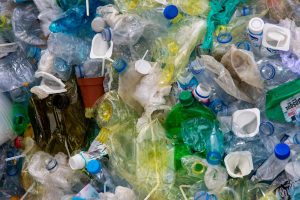
The new “neutrality of plastics”. Corporate agreements with Geocycle for co-processing.
As described above, burning plastic waste in cement facilities is not new, but now companies are using a new false discourse of greenwashing of «circular economy», using incineration as the best recycling alternative and calling it the new plastic neutrality.
In 2021, Nestlé Mexico announced its «new plastic neutrality» by doing business with Geocycle to burn in Holcim’s cement kilns the equivalent of its generated – mostly single-use – plastic waste. Geocycle has been preparing for incineration Nestlé’s post-consumer plastics and waste since 2005.
Major consumer goods corporations such as Coca-Cola, Unilever, Nestlé, and Colgate-Palmolive are doing big business with cement companies to burn their plastic waste instead of reducing its production and consumption.
Now, Mexico is the scenario of false solutions, of green washing, of industry protection, of evading clear and strict policies of Extended Producer Responsibility (EPR) without incineration and used waste to generate energy; where human rights and international environmental policies are not respected; where work is being done to evade the plastic crisis; all this with the support of the State.
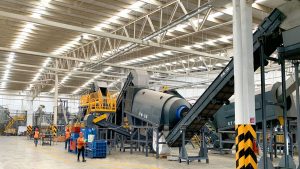
Direct Pack Mexicali: Intensifying Waste Colonialism in Mexico
In 2023, the US company Direct Pack Recycling announced the operation of a new PET recovery/recycling plant in Mexicali, Baja California, for the manufacture of pellets and thermoformed packaging (cups, lids, trays), financed by The Recycling Partnership Coalition , which clearly indicates the intensification of colonialism through plastic waste coming from the United States into Mexico.
This coalition is integrated by the most powerful corporations around the world, such as the beverage and food industries, petrochemicals, and consumer goods, including Coca Cola, Danone, Procter & Gamble, Unilever, Dow, Braskem, Walmart, Eastman, Indorama Ventures, Colgate, ExxonMobil, Nestlé y Pepsico. These coalitions conduct contests to finance polluting establishments in Mexico, that increase the green makeup of the toxic recycling of single-use plastics.
In addition to the increase in the exportation of dirty and contaminated plastics from the United States to Mexico already exposed in this platform, they are now transferring us “recycling” facilities with a technology that is not accepted in the United States given its economic infeasibility, excessive use of water, and high environmental impact. If this is not enough, the “recycling” plastic from Direct Pack will come from the United States.
The Direct Pack company at Mexicali is capable of treating more than 18 million kilograms of PET per year, so we can estimate that its use of water will be around 197 thousand cubic meters of water per year (1,3 gallons of water/lb.); this will put it in the 10 industries of mayor hydric consume at Baja California capital according to data from the local operator organism. This volume of water is equivalent to what at least a thousand families consume a year in Mexicali, Baja California.
This occurs while the Colorado River basin suffers the most severe hydric crisis in its history, and Baja California is in a situation of serious water stress. The principal users affected by the drought are the farmers from Mexicali Valley and the cities from Zona Costa, who are dependent on the water sent from Mexicali. The establishment of any high-water-use plant, such as Direct Pack, will aggravate this situation.
Moreover, Mexicali is considered one of the most polluted cities in Mexico and Latin America. According to the Mexican National Air Quality Information System (SINAICA), Mexicali ranks second in PM10 pollution. In 2022 it presented averages of 658 hours with unhealthy air quality and 679 hours with “unhealthy for sensitive groups” air quality, based on the Air Quality Index (AQI) of PM2,5, according to the local organization Redspira. There are also high levels of ozone and carbon monoxide pollution.
The state’s capital presents the highest number of illnesses related to air pollution (acute respiratory infections, ischemic heart disease, asthma, as well as premature deaths), more than twice as many as in Tijuana. Direct Pack’s operation will increase air pollution and associated health problems, especially in the area where it is being installed, which is one of the most polluted in Mexicali.
Furthermore, the company was established without having submitted an environmental impact assessment and other authorization and was therefore suspended by the state environmental authority. However, they are applying for these permits to reactivate their activities.
Recycling has demonstrated not to be the solution for pollution and the crisis generated by toxic plastics and other waste; therefore, the production of single-use plastics should be discontinued and EPR policies should be established. Furthermore, plastic recycling is toxic because of the additives that are added to it, such as phthalates, among many others for PET, which accumulate in new products.
It is urgent that the federal environmental authorities and the government of Baja California and Mexicali do not allow or authorize the operation of facilities such as this one in Mexicali or elsewhere in the country, since this type of PET thermoforming plant means more pollution, depletion of water resources, an increase in the toxic load on human health and ecosystems, as well as an incentive to increase the toxic body burden on human health and ecosystems.
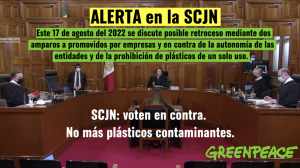
Single- use plastic ban in Oaxaca
Oaxaca was one of the local congresses that legislated the ban of single-use plastics, including polyethylene terephthalate (PET) and expanded polystyrene (EPs), as a protective mechanism for the environment and to stop the plastic crisis in its territory.
In response, in July 2019 and November 2020 , the companies PROPIMEX (S. de R.L, de C.V), and Oxxo (S.A de C.V) , the mexican enterprise of convenience stores, both linked to FEMSA Coca-Cola, promoted a law suite (amparo) against the legislative measure. A district judge denied the amparo, and the case was taken up by the Supreme Court of Justice of the Nation (SCJN), who, in August 2022, ruled that Oaxaca’s state does not have the faculties to prohibit single-use plastics.
Thus, SCJN protected FEMSA Coca-Cola, PROPIMEX, and Oxxo regarding the ban on single-use plastics in Oaxaca. The highest constitutional court of Mexico decided that Oaxaca’s state authorities had invaded the federation’s competence sphere when they prohibited the sale, distribution, and usage of single-use plastic packaging, wrapping, and other products elaborated with polyethylene terephthalate (PET) and expanded polystyrene (Eps/ Styrofoam). It also ruled that said prohibitions within local law are unconstitutional because they do not comply with the waste national policy. By approving this Amparo, SCJN set a precedent (rules) for other local laws seeking to reduce PET, EPs, and other single-use plastic waste production not to be respected.
The Court’s decision opened other industry appeals against every protection measure, according to the Court’s criteria.
This federal act represents a dangerous legal regression in terms of environmental protection that undermines the ongoing efforts of other local governments to protect their territories from toxic plastic pollution and discourages federal entities from undertaking increasingly protective legislative measures to protect human health and the environment, thus violating the Principle of Progressivity of Human Rights. Moreover, it sets a serious precedent that will have a long-term impact on the health of the population and future generations.
Faced with this situation, environmental, health and consumer protection organizations such as Greenpeace Mexico, El Poder del Consumidor, Acción Ecológica, Asociación Ecológica Santo Tómas, Fronteras Comunes, the last three of which are part of la Colectiva Malditos Plásticos, presented in March 2023 a series of legal actions so that subnational entities can ban single-use plastics, a process in which they are accompanied by legislators and residents of the City of Oaxaca and international organizations such as the Global Alliance for Incinerator Alternatives (GAIA), Break Free From Plastics (BFFP) and the Environmental Defender Law Center (EDLC).







